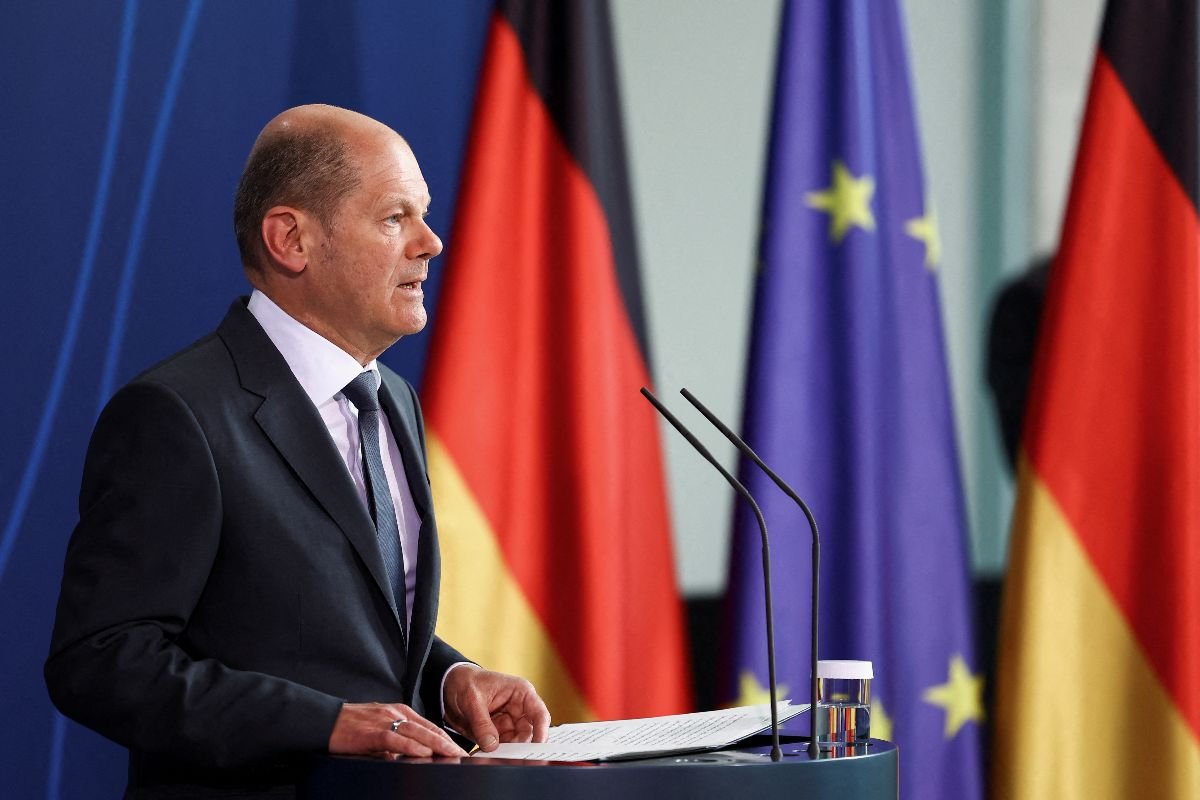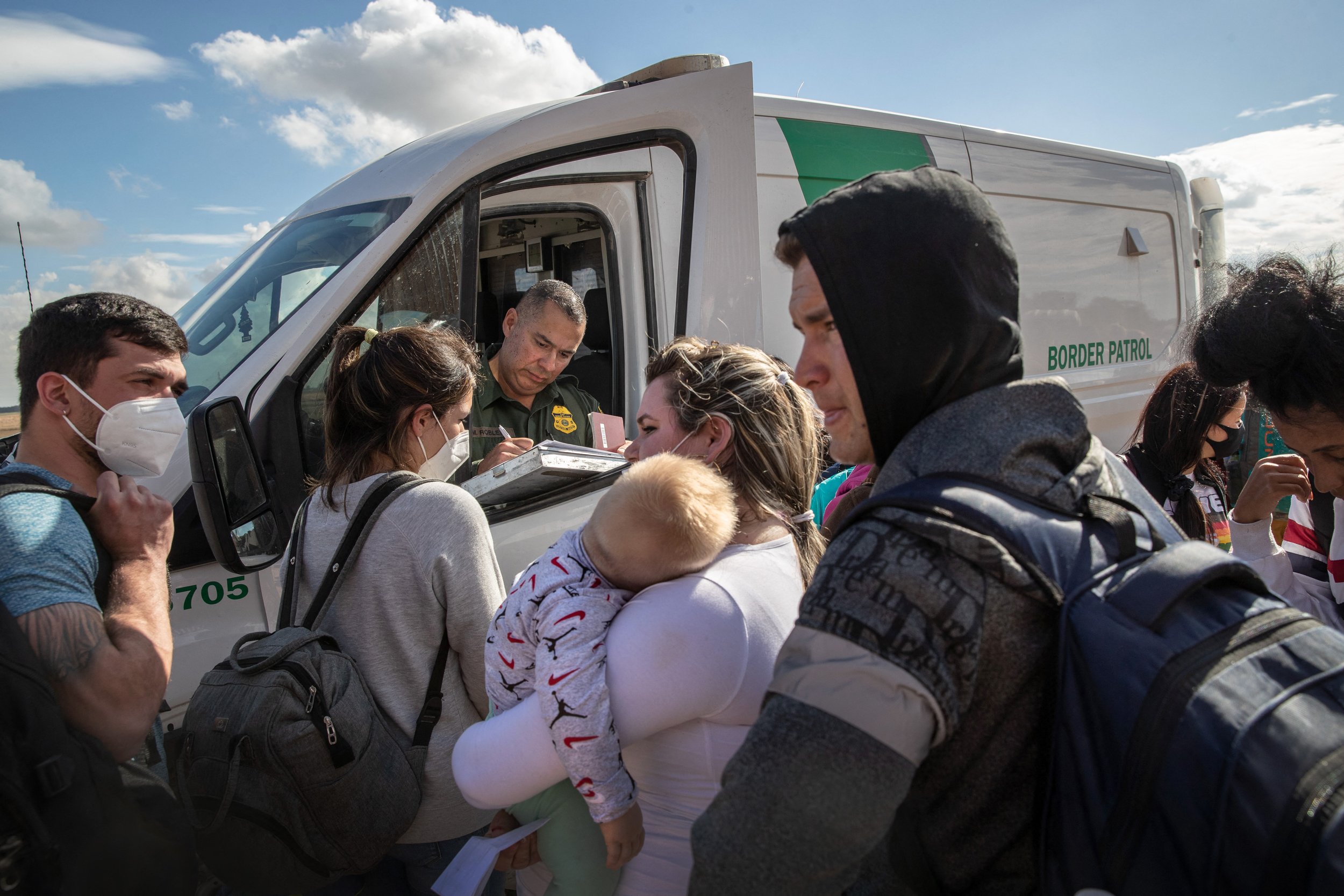Germany, Militarization and Ukraine
German Chancellor Olaf Scholz addresses the press after a video conference with heads of state on Ukraine on April 19, 2022 in Berlin. [Lisi Niesner/AFP]
By Peter Kuras
Amid the ongoing war in Ukraine, Germany is having a moment of soul-searching. Should the European Union’s most prosperous member once again become a military powerhouse?
Shortly after Russia’s invasion of Ukraine, German Chancellor Olaf Scholz announced plans to create a special 108 billion euro fund to increase the combat readiness of the German military, known as the Bundeswehr. The move, which is part of a broader push to increase Germany’s military spending, marks a major departure from Germany’s post-WWII policy of maintaining a purely defensive military – and especially for Scholz’s Social Democratic Party.
Even though the funding won't add many new capabilities to the German military (it will instead be used to modernize equipment) the debate in Germany about the military has changed substantially since the war in Ukraine began. While conservative Germans have long advocated for a stronger military, the Social Democrats and the Greens, who are coalition partners, have traditionally stood for a pacifist Germany. Both parties are currently struggling to adapt to the threat of Russian aggression.
I talked to Timon Dzienus, co-chair of the Green Party’s youth organization and one of the most vocal critics of Scholz’s rearmament plans about militarization and security.
(This interview has been edited for length and clarity.)
You’ve been very vocal in your criticism of plans to increase German military spending. Doesn’t an increase make sense in light of what’s going on in Ukraine?
I think there’s a widespread feeling of fear and uncertainty in Germany, as there is in many other countries at the moment. That is not a good position to make long-term decisions about rearmament.
And Scholz’s proposal to create a 100 billion euro special fund for the German military is exactly the sort of thing that should be subject to long-term debate. It has nothing to do with short-term aid to Ukraine, or to the Ukrainian people. It isn’t even about immediate improvements to the Bundeswehr’s readiness. It has nothing to do with the concrete issues that are worrying people right now.
Even so, there has been very vocal criticism of the Bundeswehr’s readiness – the parliamentary commissioner of the armed forces recently described some army bases as “desolate,” and there have been reports of German soldiers serving without appropriate underwear or cold weather gear.
The Bundeswehr’s budget has seen massive increases over the past few years, so the claim, which you hear a lot here in Germany right now, that we’ve saved too aggressively on military spending is just wrong. In 2014, Germany’s defense budget was [$35 billion]. Last year, it reached [$50.7 billion]. We should be talking about reform, about efficiency and about procurement processes. Those should be the priority right now. Not just talking about big, round sums.
Big, round sums?
I think we should always be suspicious when politics is conducted with big, round numbers, like Scholz’s 100 billion euro special fund. We should be talking about specific security needs – what does the Bundeswehr have, and what do they need? – rather than just focusing on big numbers.
There has been some debate recently over the possibility of reintroducing mandatory military service. Some on the left think that this could be a way of preventing the army from radicalizing towards the far-right and that politics will be less aggressive if the sons of senators and CEOs are serving in the armed forces.
I find mandatory military service to be a completely absurd suggestion. Again, it completely ignores the actual need. The Bundeswehr doesn’t have the capacity to accommodate that many new recruits. There isn’t even a personnel shortage in the Bundeswehr to necessitate this kind of step. Even if there were, though, forcing all of the young people to serve in the army would likely lead to a more militarized society and, given our history in Germany and our responsibility to promote a politics of peace, I find it reckless to suggest reintroducing compulsory military service. But even among the Christian Democratic Union (the center-right party) there is no majority for mandatory military service – so this is not a major debate we are having right now.
What is the actual need at the moment?
There are other questions that are much, much more urgent than military spending right now. Arms supplies and humanitarian aid for people in Ukraine. How Germany can become independent from Russian gas as quickly as possible. We could use the 100 billion euros that have been earmarked for the Bundeswehr to build wind turbines and solar panels and heat pumps, and spend it on crisis prevention and care for refugees coming from Ukraine. Those questions should be front and center – not long-term defense spending plans.
Climate change. Social justice. Education. Pacifism. It’s easy to have the feeling that the issues that have animated the Greens over the past decades have disappeared from view since the war in Ukraine began.
On the contrary! If I’m being honest, I have the feeling that many of the warnings that the climate movement and the Greens have issued over the past few years are now more urgent than ever. We have always said that our reliance on fossil fuels from dictatorships is a security issue. Suddenly, it’s become very clear that the development of renewable energy is necessary to guarantee our freedom. When Annalena Baerbock, now the minister of foreign affairs, was running on the Green party platform, she said that we should stop construction of Nord Stream 2, the pipeline that was intended to transport Russian gas to Germany. She was laughed at. Within a few days of the start of the war, however, everyone agreed that we had to stop construction.
It’s become increasingly clear that we have to think about questions of social justice, climate change, security and peace as a single, interrelated issue.




